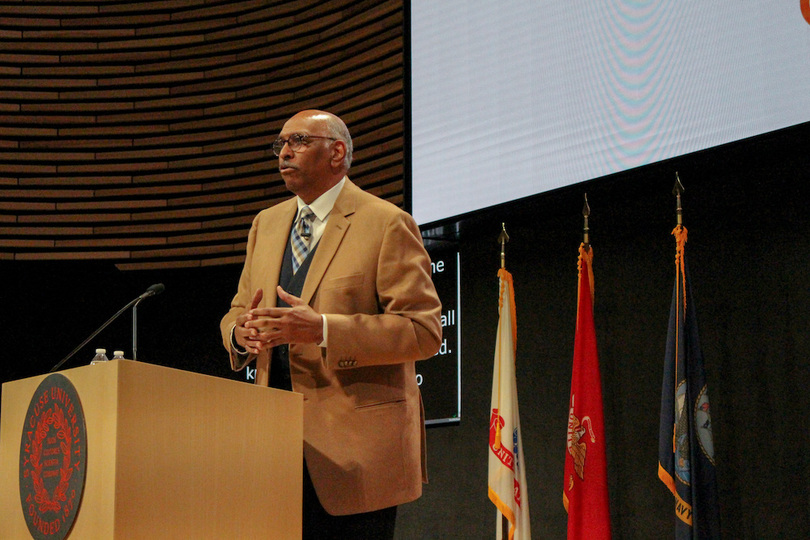Michael Steele speaks on time as Maryland Lt. Gov., political landscape

Steele's speech focused on the connection between faith and public service as a part of the annual Borgognoni Lecture. Danny Amron | Asst. News Editor
There’s still one Orange to root for — The Daily Orange! Donate today and help us win College Media Madness.
Standing at the podium of the KG Tan Auditorium at Syracuse University’s National Veterans Resource Center, Michael Steele opened his speech with a question.
“How do you respond to the pressures of a world that demands that you not only give to Caesar what belongs to Caesar, but you give to Caesar what belongs to God?” he asked the audience.
Steele, the former chair of the Republican National Committee, gave his speech for the annual Borgognoni Lecture in Catholic Theology & Religion in Society on Monday night.
Steele focused on the connection between faith and public service throughout his speech, referencing conflicts between the two he faced as lieutenant governor of Maryland.
He highlighted the first time the governor was faced with the decision of executing individuals under Maryland’s death penalty laws, where Steele disagreed with the policy due to his pro-life stance. The governor had recently rescinded the state’s moratorium on the death penalty.
Recounting the experience, Steele said that while he disagreed with the governor’s decision, he was given the platform to speak with the lawyers, review all the documents the governor had and speak with the families of both the victims and the death row inmates.
He noted that while the easier decision could have been to keep quiet and prepare a statement if the media questioned his stance on the issue, his faith required him to be involved in the process.
“Here was the lesson to not conform, but to stand girded in my faith, in my tradition, and what I believe,” Steele said. “To express that openly and honestly in such a way that those who would ordinarily be opposed to my even being in the room, for fear that I would somehow change the outcome or whatever their concerns would be, wanted me to be there because they saw the value of my faith in what I had to say.”
After ultimately deciding to go forward with the execution of the inmates, the governor followed his statement with a request to Steele to take a deeper look at Maryland’s system of punishment and how the state implemented the death penalty, Steele said.
“It is important for us to understand the value of not only being firm in what you believe and holding true to that, but also making a case for the dignity of the lives of others. And while you may not win, such as it is in that moment, God’s got a plan,” Steele said.
Steele said he approached his term as lieutenant governor as if he only had four years to serve his state, which ended up being the case.
“‘Be not afraid’ is the cornerstone of one’s vocation, one’s public service,” Steele said. “In answering what this service commands, each one of us must not be afraid to stand in one’s faith against those who would ridicule you, stand in one’s faith against those who would distort the truth of your words or even stand in one’s faith against those who want to unelect you.”
He then focused on the current behavior of politicians, characterizing them as seeking to serve themselves rather than their communities and providing excuses that allow them to do so.
“There are no buts in your vocation. There are no buts in your faith,” Steele said. “… those in need are often isolated, relegated to nothing more than a statistic or decimal point on some bureaucrat’s bottom line. Moreover, those we serve must not be exploited for political gain, indentured for the well-being of others, or even constrained for their own supposed state of proved good.”
He added that leaders should not be afraid to incorporate their faith to properly represent the people in their communities rather than their own self-interests.
Steele noted that the sentiment of exploitation currently pervades the modern American political landscape, leading politicians to get lost in their duty of public service.
“Leadership is born out of the spirit of service. And it is our understanding at the end of it all: what service means to others, how we can inspire and how to transform lives,” he said. “That’s what defines leadership.”





